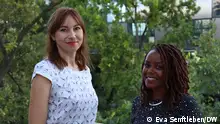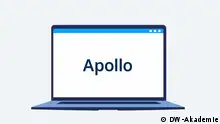International Media Studies
From environmental journalism to self-censorship: Elective week for IMS students
Third semester IMS students spent a week taking a closer look at one of three topics: journalists in conflict situations, environmental issues and tricks for video editing.

Khan Rahat Al Rafe wants to untangle environmental terms and issues and make them easier for people to understand
Khan Rahat Al Rafe
spent a week learning more about environmental issues. Although everyone is affected by climate change, says the IMS student, it's not always easy to understand.
Why did you decide to take a closer look at environmental journalism?
I'm from Bangladesh, a country badly affected by climate change. When I joined the Master's Program, learning about science journalism and environmental communication was a priority for me. That's why I chose this elective.
What did you learn during the elective?
I learned how to clearly and effectively convey information about the environment – how to conceptualize a video about an environmental issue, for example, or how to write a news story or a press release. Environmental communication is special because much of it is about science and there are a lot of scientific terms and technical concepts. I learned how to make them easier for people to understand.
Why is this know-how important in the media field?
We have a lot of environmental issues in Bangladesh that are not really addressed by the media, and there are not enough professionals who are skilled in conveying these types of topics. I see myself working in this field one day.
Anna Sevchuk
is involved in a research project for third-semester IMS students that focuses on self-censorship in conflict situations. The one-week elective gave participants a chance to compare their findings.

Thumbs down for self-censorship. IMS student Anna Sevchuk wants to understand why self-censorship develops - and how to avoid it
Why did you decide to take a closer look at self-censorship?
I had long wanted to focus on self-censorship and had already conducted research on related issues back in Ukraine. Having studied it there and now here in Bonn, I found it logical to take an even closer look. My country is currently in conflict and that's also why I wanted to learn more. Having already worked as a journalist in Ukraine, I wondered whether I had at some point censored my own work.
What did you learn during the elective?
I already had an idea about self-censorship because I'd been attending a seminar on the topic and already knew something about conflict reporting. I'd also conducted research in Ukraine and spoken to media experts there about self-censorship. The one-week elective was about meeting with fellow students and merging our findings. This was challenging because we'd all been to different countries and we each had different findings. But during the elective I learned to identify common trends.
Why is this know-how important in the media field?
Quality standards in journalism should be universal but there are situations, like in conflicts, when they can fail. I think it's important to understand why. One usually censors oneself under pressure or threat. It's important to understand these mechanisms in order to develop more specific guidelines for situations like these.
Thomas Mayer Rieger
was at times glued to the computer during the one-week “Digital Multimedia” elective, trying out new approaches including how to animate pictures and text overlays.

No postproduction without a storyboard: IMS student Thomas Mayer knows that you can’t fix everything just by using effects
Why did you decide to learn tricks for video editing?
I've got lots of experience when it comes to shooting and editing videos, but not as much when it comes to post-production.
What did you learn during the elective?
We worked with Adobe AfterEffects, a post-production software that helps you make videos, images and texts more interesting and dynamic. I learned that when you’re producing a video, you have to have a plan and a structure right from the start. It was also good to learn about the possibilities that the software can offer.
Why is this know-how important in the media field?
We have to grab people's attention. There are so many things out there and so much content. High-quality videos stand out and help people understand the stories we want to tell.
DW recommends
- Date 31.10.2018
- Feedback: Send us your feedback.
- Print Print this page
- Permalink https://p.dw.com/p/37OzE
- Date 31.10.2018
- Send us your feedback.
- Print Print this page
- Permalink https://p.dw.com/p/37OzE


